Ethan Renoe's Blog, page 10
November 18, 2023
Gratitude as a way of experiencing reality

In Numbers 11, God sets people on fire for complaining.
Ten chapters later, God sends poisonous snakes to bite people for complaining.
Of all the things on earth God hates so much that He kills people for it, I wouldn’t think complaining would be the top of the list. Granted, the Israelites weren’t in the greatest of conditions, so a little complaining about the lack of food selection and spartan conditions seems allowable.
But no. Boom, dead.
I realized today that when we complain, it’s because we have an alternate reality in our minds, and we wish that it was actual reality.
Who creates actual realities? God.
When we are grateful, however, it’s kind of like taking inventory of things that are real and present in our lives. Gratitude is a way of pulling ourselves down from the clouds and into the very realness of our own lives.
If you were to make a list of ten things in your life you’re grateful for, you’d be making a list of things and people and circumstances in your life that are real, more than imagining a reality you wish you inhabited and then bemoaning the disparity between the two.
By being grateful, we remind ourselves of real things.
When we complain, we are hung up on the imaginary.
Not only that, but gratitude is the root of our worship. You cannot worship God and complain at the same time. But when we acknowledge what God has given us, it naturally escalates to worship. Think about the first words of the doxology:
Praise God from whom all blessings flow
The implication is that we have received blessings from God, and this leads us to praise God. I used to wonder why that was the first thing used to identify God in such a primary song. Why is the fact that He gives us blessings the greatest thing about Him? But now I get it: It’s starting from the human perspective of recognizing that we have been blessed, and this leads us to worship.
So, have you taken time to be grateful lately?
Let us reflect on the reality we inhabit, and all the things God has given us here and now, rather than imagining our own worlds and longing for them. (complaining)
e
November 15, 2023
Sunday School Sins

There are sins we are okay with God knowing about, and sins we aren’t.
I stood before a retreat I led and explained how we were going to to write down our ‘shame lists.’
We had been reading through Mark 5, where the writer describes a woman who came to Jesus after 12 years of bleeding, which would have made her ceremonially unclean. Thus, she would have been shunned from family and friends.
For 12 years.
It also recounts the story of the demon possessed man in the graveyard who was cutting himself with stones (unclean) and kept breaking out of the chains the townspeople kept putting on him, outside of the town by the pigs (unclean).
If we think about this from their perspective, they’ve just had every part of shame in their life casually listed off, broadcast to be read in the Bible for all time. The writer needed to establish just how low and ashamed these people are, so it can be contrasted with how little Jesus cares about their ‘shame lists.’
He touches the lepers and the unclean constantly.
He talks to people He’s not supposed to.
He isn’t scared of their deepest shames or sins.
Yet if we think about how we discuss our own sin and shame in church, it’s not quite so honest…is it?
I’ve termed these our ‘Sunday School Sins.’
It’s the sins that are okay to name in church; the ones we can use in sermon examples that aren’t too graphic or specific. For example, no one in my youth group ever struggled with porn and masturbation…just “lust.”
No one cut themselves or hated themselves so much they wanted to die… they were just “going through a tough season.”
It was just their Sunday School Sins.
I believe, however, that our healing can only be as deep as our confession. If we are only honest with our friends and family to a depth of two inches, we shouldn’t be surprised when our healing also only goes down about two inches.
Jesus wants to plumb the depths of our hearts to bring full healing rather than remain on the surface…the place a lot of churches stop.
So on the retreat, when I had everyone write down their ‘shame lists,’ we came back together 30 minutes later and I asked if anyone wanted to share their list. To my surprise, many of them did. Almost all of us shared, through many tears, the items on our shame lists. Each person’s confession was met with love and embraces, and we felt baptized by the end of the night.
James 5:16 says to confess our sins to one another so that we may be healed. In other words, it’s not so that we may be forgiven, or so God will like us more after our penance.
It’s so that WE may be healed.
It’s for our own benefit.
And why do it to one another, not just to God? Well, because we don’t always hear God’s words of love and grace spoken back to us in response. We are the body of Christ for one another, meant to be here for one another, to receive confessions, give love, and spur one another on.
So, sure, you can tell your (trusted) buddies that you just struggle with ‘lust,’ or ‘anger,’ but the deeper you dive into the depths of your own heart, and the more honest you are, the deeper the healing you’ll find.
If Jesus only came to forgive our Sunday School Sins, I don’t really want anything to do with him. Kind of a useless savior if that’s all he can handle.
But if He came to heal us down to the very floors of our souls, then we do indeed need to begin acting like it.
e
March 30, 2023
“I’m mainly a Christian so I don’t go to hell…”
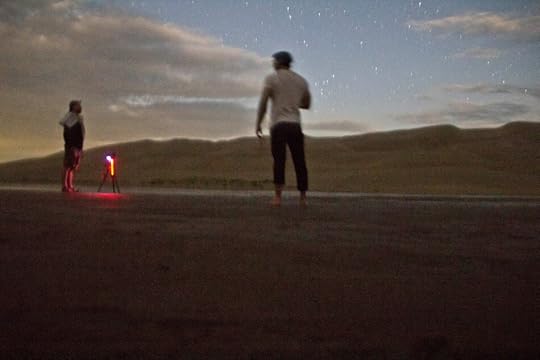
Today I got a message in my inbox:
Hi Ethan! I came across your article on Church Leaders, and I’m just so thankful I finally found someone who explains exactly what I’ve been feeing for so long… I do have a question though, how can I know if I’m even saved in the first place? Just like the student you mentioned in your article, my main reason for believing is really just my fear for hell…
I began to reply to her but then realized that it is not a simple reply, but (at least) an entire blog post. So here are some thoughts. If I can make just a few people a little less scared of God, it’ll be a massive success.
–
I distinctly remember the morning: I was probably in 4th grade(ish), and at a Colorado summer camp that no longer exists. The sermon that morning had been on the gospel, with a special emphasis on hell. My small group sat outside in a circle and I told my counselor that, yes I was indeed scared of hell, so I’d be praying to accept Jesus.
It was probably my sixth time accepting Jesus (phrase open to interpretation) but, like the respondent today, I wasn’t sure if the other 5 times had yet worked. I didn’t feel any different.
Fast forward to Australia when I was 19. I was getting baptized and hoping very badly that I would feel different when I emerged from the water. Yet again, I rose up from the ocean and felt the same as before.
It would be almost a decade before I began to unpack a lot of what the Bible teaches about salvation, the gospel, heaven and hell, knowing Jesus, et al., and realize that the way it’s all packaged to Americans is tragically below what is actually in the Bible.
Too often, the gospel is presented as a golden ticket on a one-way train to heaven for a bunch of undeserving sinners. As long as your faith is good enough. And you love nothing more than praying and worshiping. And you cry every time you think of Jesus. And you give up all material possessions in order to free your desires. Et cetera.
I think that a lot of our conversionist language emerges more from Middle Ages feudalism, or Muslim conquests, than from Jesus. We have the verse which always pops into mind, Romans 10:9: “If you confess with your mouth, “Jesus is Lord,” and believe in your heart that God raised him from the dead, you will be saved.” That’s it, right? That’s the train ticket, yah?
The thing is, if you look at the chapters before and after, you find no mention of the afterlife. We never stop and ask important questions like, “What does Paul mean by the word ‘saved’?” We are so accustomed to reading the Bible through this lens of afterlife terror that we assume that any reference to being saved refers to heaven or hell. We sift all of the Bible through a filter that sorts things into ‘heaven and hell language’ even when it’s not there.
Most passages about being saved conjure images of a life raft being tossed to us in a torrential sea sucking us down to the depths. Thank goodness we are saved from an eternity down there! Better hold on tight or I’m doomed!
And that’s our Christian faith. A little inner tube saving us from the bad place.
But in context, that verse is talking about generations and descendants and the continuation of Israel and the offspring of Abraham forward into history. Paul, a Jew, is writing to Gentiles about how to get in line to receive this same blessing from Abraham and be a part of this ongoing call to bless the world. Could it refer to the afterlife? Possibly. But immediate context suggests otherwise. Either way, there is far more context to dig into than what we are typically presented with when presented with ‘the gospel.’
Anyway.
Last night I was talking to someone who’s on the fence about Christianity. He asked if, since I’m a pastor, I’ll try to convert him. I said, ‘yes, pray this one minute prayer and then you’re in forever….because that’s what the Bible prescribes.’
…Except that it doesn’t.
The Bible talks about a lot of things: knowing God, living like Jesus, transforming our minds and hearts and affections, being and making disciples, as well as a slew of action items like taking care of the poor, the orphans and widows, etc.
But it doesn’t talk about “going to heaven.”
It talks about one person going to heaven: Jesus. Because in the Bible, the word ‘heaven’ literally just meant the sky and everything in it–clouds, sun, moon, stars, etc. In the ancient mindset, there is everything we can touch, like the sea and land and plants and animals; and then there is everything up there, which is, the heavens.
And when Jesus ascended into the sky after His resurrection, He literally went to the heavens.
“But aren’t you worried about getting me into heaven?” asked my friend last night.
I said, “Maybe I would be if the Bible were more worried about getting you into heaven. The issue is, most of our conceptions of the afterlife come from Dante and Renaissance artwork more than from the Bible. It talks about life and resurrection and being with God, and living well in this life. The Old Testament has roughly 3 verses on the afterlife….”
Let that simmer.
–
“People often ask me what I believe about hell,” said my New Testament professor last year. “I always respond with, ‘do you mean Hades? The Outer Darkness? The Lake of Fire? The Eternal Punishment? The Second Death? Gehenna? Hinnom? Which hell are you referring to?”
He was pointing out that the Bible is far more complex when it talks about, well, everything. And we have oversimplified it to thinking that there is hell and there is heaven and we want to avoid the former and go to the latter and this is the Good News of the Bible…
But each passage needs to be read in context. What are the implications of each of those ‘hells’? Is Jesus talking about the afterlife, or is He talking about living in sin so that your life (this life) becomes a literal garbage pile (Gehenna–a word often translated as ‘hell’ in English)?
Or what about the fact that Jesus ONLY talks about hell with the religious teachers, and never with outsiders like the prostitutes, tax collectors and sinners? Seems that if anyone was in danger of being scorched by hellfire in Jesus’ eyes, it was the exclusive religious folks, not the outsiders.
What about the fact that there is not one clear, distinct method by which people are saved in the New Testament? You’d think that if it were so important, Jesus would have laid out the instructions for how, exactly, to get to heaven, or a prayer to recite so we can lock it in. Instead, the only formula we get is the Lord’s Prayer, which is surprisingly lacking in language about the afterlife, and deals exclusively with our life on this side of the grave.
So all this begs the question then, what is the Good News? What is Christianity? Is it merely a method of escaping hell? If that was the overarching narrative of the Bible–that we are bad and the world is bad and hell is coming, unless you manage to convert to Jesus–then it would seem like predominantly bad news. Or at the very least, scary news.
When you’re writing a story, it’s the bad guy who has the plan. S/he’s the one driving the plot forward. The good guy is just responding to the plan of the bad guy and always ends up thwarting the bad guy’s plan at the last minute. Think of any movie you’ve ever seen. Who was the one with the plan, driving the plot forward?
Is this true of the Bible too? Satan had a plan to pull us all to hell, but Jesus managed to outwit him at the last second with the cross and salvation, thank goodness? Who is really driving the plot of the universe forward?
Maybe we should take a larger look at life, at creation, at the universe, and see that the Good News of God is actually that God is the One who had a plan from beginning to end and it is a good plan. He wants us to thrive and enjoy life and live well and not go down paths that are bad for us or for others. He doesn’t want us to destroy ourselves or those around us.
Jesus says that His way of life (His yoke) is light and easy and leads to rest for our souls (Matthew 11).
This doesn’t sound at all like the street preachers downtown telling pedestrians that they’re on the road to hell.
This doesn’t sound like an invitation to fear and worry and fretting about whether we are in or out.
This sounds like wholeness and shalom.
It sounds like freedom to love our neighbor and the outsider and the stranger; to love our work and enjoy creation and add to it by becoming little creators ourselves. Paint, make pottery, do yoga, lift weights, start a business, tend your garden, dress in funky thrift store finds, look at nebulas through a telescope, write a poem, have coffee with your annoying neighbor, and all the rest of the elements of the good life.
It’s all part of the Good News.
The Bible is far less myopic than we often make it.
Let us never come to it again out of fear of hell.
e
March 6, 2023
A dating app led me to God (a rant)
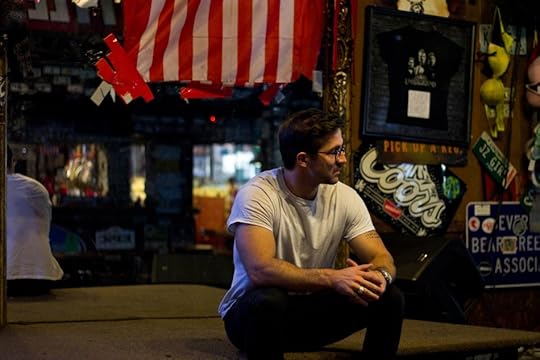
I’ve gotten bored with the swiping on dating apps; with the deciphering of what ‘spiritual’ means in a nearly post-secular culture. Oh, you’re tired of materialism? And I don’t mean the type of materialism that fills your closet with shoes, but the type that says
This is all there is.
If it’s matter, it exists;
if it isn’t, it doesn’t.
You fill your life with the essence of spirituality because there is some sort of profound longing that points you to God…or a god. Pick your deity. Or just put a dollar in the slot and be surprised by whichever divine entity emerges from the infinite vending machine. Take your last breath, cross your fingers, and pray for blue raspberry.
I’ve been there, upon the questioning precipice of existence. You’re standing on a thin shelf, don’t step too heavily like my upstairs neighbors. It’ll shatter.
You’d be an atheist if only you had the guts…and didn’t have the desires.
It’s our desires that draw us to God…and from Him.
We’re caught in the paradox of seeing through a mirror dimly…but we are still seeing. That’s the mystery.
What truth there is to know, let us speak it.
Let us know it.
Keep the word on your lips
and your ear to the ground.
The fat is rendering and soon we will either have soap or a bomb.
Clean, destroy, or both.
The gospel is that you pick up your cross and suffer…but you’re also washed and clean.
The Glycerin Gospel.
Fight Church
I’m looking for perfection in an app. I didn’t come up with these standards I’m seeking (eternally), they were handed to me.
How many degrees from perfect are you? And can you sum it up in a bio and five photos while I make my split-second decision?
I’m over these dating apps and the inherent dread that accompanies them. I’m over the inherited measures of perfection, and the tailing angset (as Kierkegaard would say). I want to believe that man can be free, but the concept is too weighty and the potential is too promising to bear.
This kid once told me that he was reading Camus (he pronounced it “Camuss” lol) and believes he can be free. I’d like to believe you, Camuss Kid. I wish we could undo the binding trauma of 9/11 and the collective tragedy of, well, everything else, and be free. Especially from advertising and Disney movie endings.
I once read that Big Brother isn’t monitoring us anymore; he’s just entertaining us to death. Because if our brains are turning to mush before a TV screen, BB doesn’t even need to watch us. Same could be said of the satan and the church — an entertained Christian is a harmless one.
We need more poet preachers.
We need more creative people in the church.
Those who create model the first thing we learn about God (that He’s creative).
Therefore, creativity is inherently a violent onslaught against evil.
Let us speak true words into the universe, the way God spoke creation into being.
Let us look at, say, the Pillars of Creation, and tell them to dance.
Let us delete every app on our phone and look one another in the eye.
e
January 30, 2023
The best worship song ever?

What sort of language can describe a God who exists beyond the realm of not only language, but comprehension?
I have no idea how many worship songs I’ve sung in my life—hundreds? Thousands?
And some I like more than others.
Some seem more worshipful—more directly aimed at this God we aim to worship—than others. But the more I think about it, every single song that sings about God, directly or indirectly; worshipful or merely descriptive, is just a metaphor held against the reality of describing a deity.
Take a favorite of mine, from (surprisingly) Hillsong, “From the Inside Out”:
Everlasting
Your light will shine when all else fades
Never ending
Your glory goes beyond all fame
I had always thought of this as a powerful chorus of worship, aimed directly at God. How could it not be? We are singing directly to God, praising Him and His glory and eternality.
But look at the actual words: They are metaphors about light shining (a scientific phenomenon), and measures of time. Then more measures of time (never ending) and then a line about glory and fame. The same could be said about any insanely famous celebrity, could it not?
So, in one of my most worshipful songs, we have lines that boil down to describing time, fame, and light. Others may anthropomorphize God and sing about Him in human terms. Others sing about the worshipper and their posture toward God.
Try to think of a worship song that speaks literally about God. No metaphors, just actual, worshipful description…are there any? Or can we only address the Divine through the medium of metaphor? Look at several other classics:
“Come Thou Fount” — God as a fountain?
“Amazing Grace” — Not even directly about God, but about His grace…which has a sound?
“Nothing but the Blood” — Using the metaphor of washing sin away, as if it were dirt or grime on our souls. Unless any of you have literally gotten your hands on some Jesus blood and used it in a bath…
I’m not saying any of these are bad, or worse than other songs (after all…what other songs are there?). It’s making the use of all we have and aiming our intentions at worshiping this infinite and amorphous deity.
At the end of the day, all we have is metaphor.
The best our worship can hope to be is metaphor.
Really good metaphor.
Perhaps this is why, after giving it some thought, one of my favorite hymns has long been “Be Thou My Vision.” This is one that sings about both God and the singer—how the singer wants to make God the central focus of their life.
After listening to countless lectures from psychologists, as well as one TED talk by a pickpocket, I’ve realized more and more the value of attention. In fact, the pickpocket dropped a simple but fascinating line about how we humans have no shortage of information, and therefore, knowledge. This means that information is less valuable than attention which directs a person toward certain information and away from other.
Attention is more valuable today than data.
It’s fascinating.
And really, this isn’t new to humanity. At least, not since the hymn was written. The hymnist is asking God to become the central focus of their life, to draw their attention such that all else fades to a blurry bokeh in the background. Look at the first three lines about how the writer wants to see God:
Be thou my vision, O Lord of my heart
Naught be all else to me, save that Thou art
Thou my best thought, by day or by night
One of, if not the most worshipful thing a human can utter to God is for God to consume the Christian’s attention above all else. For the Christian to not pay as much attention to anything on or above this earth. If attention and affection are two of the most valuable resources on earth, then offering these to God is one of the most worshipful acts one can offer. Perhaps this is one point in a hymn where the metaphor actually becomes less metaphorical and more tangible. Will we offer God our attention and affection above all else?
We could sing about His justification (a legal metaphor) and His grace (profound yet still intangible), and we are still trading in the realm of metaphor. Perhaps our language will always hover just above the reality of our faith until, as a different hymn proclaims, our “faith becomes sight.”
Until then, we just keep “singing new songs to the Lord” in an attempt to fully capture the divine in a few bars of poetic metaphor.
e
October 8, 2022
Everything as Metaphor
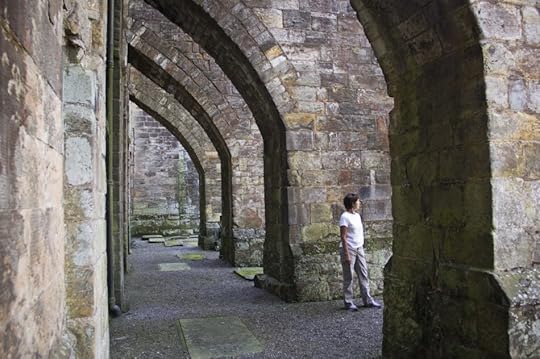
A week ago, when I knew nothing and hated tangible metaphors, I was at a camp experience which delved deeply into our pasts, traumas, shame, and beliefs. For the first three days of the camp, we were instructed to carry a large rock (bread loaf size) around with us everywhere, including the bathroom.
On the third day, we were told to make a list of lies we believed — things which made us feel shame or worthless — and write them all on the rock.
Then later, with our small groups, we went out into the woods and could do whatever we wanted to the rock. Some people smashed them with a hammer. Others buried them. Some did both. Some peed on their rock. Some laid their rock gently at the base of a tree, symbolizing relinquishing their shame and false beliefs to the foot of the cross of Christ.
I decided to smash mine, put it in a hole, pee on it (mainly because I had to go), bury it, and then do an embarrassing dance on top of it.
The thing is, all the other dudes in my group cried while obliterating theirs. Others got angry while smashing them. But all of them were emotional. Except me. I didn’t see a connection between words written in Sharpie on a rock, and an action I took against the rock, as having any real effect on my own life or self or thoughts or beliefs.
The exercise, which was so powerful to some people, meant almost nothing to me, because I couldn’t grasp how the idea of metaphor doesn’t just help us understand reality; metaphor is reality.
You can’t describe God.
We can anthropomorphize Him, of course. We can use phrases like,
the hand of God has touched my heart.
The mouth of God speaks truth.
The eyes of God are upon you.
God show Moses His backside in Exodus 33.
The psalms tell us that God is all sorts of things:
a shield
a rock (what?)
a horn
light
a fortress
a shepherd
To describe the spiritual world in any sort of detail necessarily demands metaphor. And for years of my life, I thought, I don’t want metaphor in my life, I simply want to know about God; I simply want to talk of actual spiritual things. But then, how do we go about this? What sort of language can we employ which is not ultimately metaphorical?
How can we get “closer” to a God who is omnipresent? Do we walk north a little bit? Do we take a hot air balloon to get nearer? Or is it a spacial metaphor and we have once again located language inside of our own experiential categories?
Try to say something about God, or about your relationship with God, without using a metaphor.
I remember hearing marriage discussed as a sign of God and His people, the way a spouse will stay faithful to their spouse. I thought, ok, cool, but that’s just a symbol. What’s the real meaning of it?
But suddenly, this past week, as if a light switch turned on, I realized that everything is a metaphor. It’s unescapable. There is nothing that we can do, no action or decision we can do that is more real than a metaphor being acted out on a global stage before the spiritual dimension. C. Baxter Kreuger said that all of human life and history is a theater in which the Spirit acts out the perichoresis (divine dance of the Trinitarian love) in a tangible, physical manner. And the invitation of the Christian is to act out our spirit-filled roles in a participatory way, entering into the drama of God, rather than as an observer.
In other words, being a Christian doesn’t mean that one shows up, passively attends church, and then goes on with ‘the rest of’ their lives. The ‘real’ part of their lives.
Rather, it’s an invitation to participate in this theater by acting out a role written for us and only us. Except, perhaps ‘acting’ implies the wrong thing here. There should be no acting when the individual is honest about their place in the story, knows themself, and listens to the gentle Spirit of God, moving in tandem with the movement of the eternal story.
There is nothing more spiritual than actively participating in this metaphor.
It seems that maybe God gave us all things physical as a means of helping us understand all things spiritual.
It makes me think that Christians and atheists alike who spend so much time arguing about the scientific arguments for or against God are missing the point wildly. Instead, what if we thought about questions like, how does it feel to sing songs surrounded by fellow believers? How does it feel to marvel at an ancient tree while on a hike? How does it feel to embrace a spouse whose body is growing old alongside yours, as you act out the metaphor of covenantal commitment?
Even the prophets in the Old Testament didn’t just say words to people; they often acted out messages in very symbolic ways. They were performance artists of the highest order.
That means that perhaps writing out our shame on a rock and then smashing the rock might actually DO something for us.
It means that when we eat some bread and juice in church, we may actually be acting something out with our bodies — which need physical demonstrations more than we often realize — that does something spiritual and real.
So I’m trying to figure out what it means to embrace the metaphor.
May we all grow more into God as we experience the depths of the life He gave us.
e
August 2, 2022
Grimace’s Existential Pilgrimage
 Still from Grimace’s commercial with Donald Trump, circa 2012
Still from Grimace’s commercial with Donald Trump, circa 2012It had been almost 8 years when the call came.
In 2012 Grimace vanished from the public eye, appearing only in Malaysian Happy Meal toys. And Grimace knew that no one even noticed. Mayor McCheese had told him that he looked like he had needed a break, with the usual dry tone that made it impossible to tell if he was implying something more derogatory. Grimace was, after all, an unknown blob. The gods of the McDonald’s Twitter account had referred to him twice, thus altering his ontological composition with a simple stroke of the key.
One tweet called him a taste bud, while another one referred to him as the embodiment of a milkshake. These are two very different things.
The tweets had arrived right at the beginning of Grimace’s long sabbatical, and perhaps it was these very words which prompted his existential wandering. If even his creators didn’t know what he was, how should he know? And was there a way to find out?
After all, he had thought a decade ago while purchasing the cheapest flight to South America he could find, how could he possibly be both? A milkshake is something tasted, and a taste bud is what does the tasting. This was one of the earliest recorded philosophical pontifications. Grimace happened to recall from an intro to philosophy class Socrates’ Law of Noncontradiction. A thing cannot be two contradictory things at once.
Now it was 2020, and his phone was ringing. The screen simply read “Unknown,” but Grimace knew it was probably the Hamburglar. He liked to cloak his calls, thinking it made him seem more mysterious. In the past though, these calls were just asking what time Grimace would be arriving to the filming for the promotional VHS, or asking Grimace how he should reply to a text from his latest fling. How should Grimace know? He’s just a milkshake taste bud.
“Hello?” Grimace spoke mournfully into the bottom of the iPhone.
“Grimace, it’s me,” said Hamburglar.
Grimace’s little brain gave itself a high five.
“Grimace, Macy’s is coming up and they want us back in it.”
“Did Mayor approve this? Did he tell you to call me?”
Just then a bang echoed over the valley where Grimace was sitting and eating his lunch. He was high on a hillside overlooking Antigua, Guatemala, and the volcano El Fuego had just erupted, as it does every dozen minutes or so. Still, the booming echo caused the little hair follicles all over Grimace’s body, or, bud, to perk up. Hamburglar had been saying something, but Grimace missed it all. He came back in on,
“…stoked! Get your flights booked. Or Amy can do it for you….. Hello?”
“I’m here,” said Grimace, still watching the smoke roll upwards out of the volcano.”
“Did you hear that? They want us back in the parade! You gonna make it?”
“Not sure yet,” Grimace said without even realizing he was talking.
Hamburglar said more into the phone, but Grimace was experiencing a sort of sensory overload and he put his phone back in his purse without even hanging up the call. The volcano booming, the minuscule amount of progress he had made on his existential exploration, Socratic laws. It was all too much for his little cranial folds.
In the daytime, the lava is only visible for a second as it rolls down the side of the volcano. Moreso on cloudy days, but mostly at night. At night the orange glow roars up and out of the mountain and seems to stay lit for minutes as it rushes down the hill. Grimace liked it at night because the glowing lava reminded him of glow-in-the-dark toys he used to be sold with inside Happy Meals. He and whichever glowing object would wait inside the cardboard housing, letting the anticipation build until the moment a child would part the heavens and then squeal with delight upon seeing their delicious food and their new toy inside the brightly painted box.
Grimace had allowed himself to wander backwards in time through a daydream. He remembered thousands of boxes being opened, almost every single one met with a smiling boy or girl. They’d pull him out and play with him atop the restaurant tables and chairs. He was the prize of their life; the center of their attention.
Until 2012.
In 2012, everyone forgot.
Not only did they forget, they didn’t even know what he was anymore.
There had been a time in Grimace’s life, the adolescence of his existence, when no one, including Grimace, questioned what he was. It didn’t seem to matter. Adults and children alike were happy to see a dancing purple blob and enjoy his presence. After all, isn’t that what all existence revolves around? Connection? Delighting in one another? Shared presence and association?
It used to be so simple. Grimace never knew how much he didn’t know, until he did.
Am I merely a specter, a phantom, haunting the mental background of a sole generation? he often thought.
He had spent the entire first year in Brasil. He meandered along the coast that connects Sao Paulo to Rio. He especially liked Paraty and Ubatuba (mainly he just liked saying Ubatuba).
People still smiled when they saw him. Half recognized him; half simply liked the way he jiggled as he moved. Even when he lay out on the sand beneath a perfect equatorial sun, his body seemed to still be jiggling.
It was on the bay in Paraty that Grimace had the thought, I can’t be a milkshake. I’d melt.
This realization seemed to neglect the fact that he was always in a box beside piping hot fries and a fresh hamburger, but it took laying in the Brazilian sun for him to connect the dots.
Over seven years he had made his way all over the continent. He went down through Buenos Aires and over to Chile, where he had the thought, This country is so long, straight, and thin. Has anyone eve just walked right up the middle of it, bottom to top? Straight up?
He criss-crossed the land more than once, taking buses up to the tiny nations of Suriname and French Guiana, but found little to do there. A voice nagged him any time he had these thoughts, That’s the point, Grimace! We need to escape from it all–whatever ‘it all’ is–and figure out who WE are!
He circled South America a handful more times in a dizzying scribble across the map before making his way up to Colombia, wanting to see Central America. He thought it would be simple to make his way to the top of Colombia and go right on up through Panama, but found the Darien Gap. A local in the north of Colombia told him it’s the most dangerous jungle in the world; possibly the most dangerous place in the world.
For a moment, Grimace had teetered on the words the man spoke. Should he just cut through anyway? If he made it to the other side he would be a hero; he would finally have a story to tell. He might not know what he was, but he would know the kind of balls he had. And if he didn’t make it out…maybe that wouldn’t have been the worst conclusion either.
But the local man had persuaded him onto a fishing boat which skipped over the Darien Gap entirely and introduced him to Panama. Now, it had been nearly a full year he had been making his way up through Central America, skipping mostly over Costa Rica because it was too touristy. It’ll distract me from my thinking.
Now he was in Guatemala, and faced with a decision: Go back to the States, which now felt more like a foreign country to him, or continue on his pilgrimage? He was nearly fluent in Spanish now, but still couldn’t roll his R’s. His tongue was too fat and blubbery so he mostly ended up spitting at people.
The smoke from the last eruption had mostly dissipated into the sunsetting sky. Grimace had watched it without seeing it. The thoughts of his little mind were elsewhere. He wasn’t necessarily low on funds–the royalties from his promotional VHS tapes continued to roll into his bank account somehow. Who was still buying VHS tapes from the 90’s? He had asked himself one day in Peru.
But he still felt like a part of him needed to get back to work. He left his work to try to find himself, but seemed to stumble upon more questions than answers. Perhaps he would discover more about himself this time by returning to work. Maybe, like Karl Marx said, labor is freedom from one’s chains. Maybe identity mattered less than production (something else he had inhaled from Marx).
He picked up his phone and scrolled through his contacts until he found “Dongle McWrongald.” He giggled to himself again. Hit the call button, then after a few seconds said into his iPhone, “Hey boss. I hear Macy needs me.”
The end.
July 20, 2022
On my cousin, Tyler
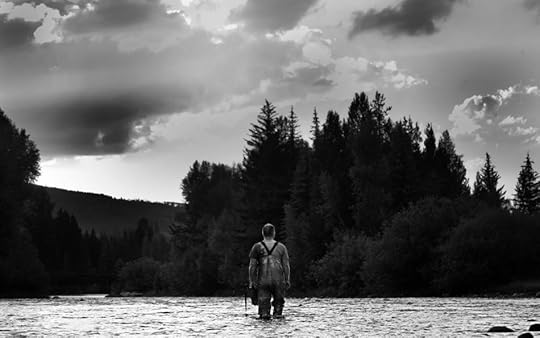 All photos by Luke Renoe
All photos by Luke RenoeJune 16, 2022
This morning there was a knock at my door while I was still sleeping. I figured it was Amazon delivering a package. Then another knock. Then they used my knocker so I knew it was serious. I pulled my shorts on, thinking they needed a signature for the package. I was trying to figure out who it could be.
I pull the door open and I’m shocked to see my parents there, wet eyes and a tissue box in my mom’s hand.
Hey buddy. We have some news.
They came in and sat on my couch. Mercifully, they didn’t hold me in suspense.
Tyler killed himself last night.
My first thought was him surrounded by his books, his close friends, in his small and quiet house in Ohio.
I don’t remember the order in which they told me the next things, but we talked through all the details.

–
I remember the night Tyler and I were at a bar in downtown Indianapolis on the far side of my twenties, him nearing his 30’s. I said we should get up and dance to the music. I joked about needing more alcohol before that could happen and he said No, that makes it less honest. When I dance, I want it to be me dancing, not the alcohol. Dancing needs to be honest. Art needs to be honest.
So I never forgot it and never danced drunk in my life.
You could say I’ve lived an honest life, but I wouldn’t.
Maybe you could say I danced some honest moves and I wrote some honest words because, according to my cousin Tyler, I did them while sober. It was me creating, not a substance.
Tyler wrote a lot of his words tipsy. He made a lot of phone calls to me while tipsy. He was a poet when he spoke. He was a genius when he wrote. Maybe he forgot his own words about the honesty in the sobriety, but looking back on it now, I’m sure it helped with the pain. The original liquid bandage.
Tyler taught me how to be cool.
–
June 29, 2022
I watched my dad bend 90 degrees at the waist and cry, hard, as we walked toward that holy soil beneath which my cousin lay (forever…and that’s the part of death I’m still grappling with). Loud and holy sobs rang out in uneven rhythm across the cemetery. My own eyes flooded. It was a sunny day and my cousin’s body lay beneath the shade of a tulip tree bursting with leaves. The simple beauty suited him well.
Dwelling beneath the soil did not.
I guess he used up all the words that were inside of him.
All his art had spilled out until there was nothing left to spill.
For a mind that, from my vantage point, was bursting with life and thoughts and humor and rhythm and sly chuckles over tobacco-stained teeth, there was a lot more that he owed to the world. He owed us more of himself. More of his thoughts and words.
But the God who let these voices call out into the darkness of his mind is not fair.
More alarmingly, I claim to believe that this God is predominantly benevolent. And it is here, after this declaration, that meaning seems to depart from word.
God? Fair? Good? In the same breath as Death and Buried?
The feeling of tremendous loss doesn’t fit inside of language…at least, none of the ones humans have created yet. We made language to convey meanings and refer to objects, but none of them can yet describe grief, or God.
–
When I was nearly done with high school, Tyler and I took a midnight walk around the golf course behind his house. Then he drove me to Denny’s at 1am and I thought it was so cool. We talked about existentialism as if I knew what it meant.
Tyler was a better poet than I am. He was honest and I’m filtered. Maybe that’s the difference between someone who rolls his own cigarettes and someone who’s scared to smoke: honesty.
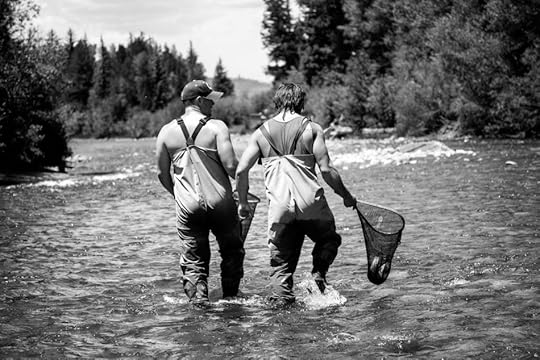
–
July 20, 2022, Lost Coffee
How many paths can blood take to the head?
Were you nervous about discovering the answer that lurks behind the universe?
There is a pain that leads to death and a numbness that does as well. One just takes longer than the other, but you’ll get there eventually. I’ve been numb in the busyness of this summer. I haven’t cried enough for my cousin.
I’ve sat before with many people in their grief, but never experienced it myself, save after the death of a dog. Tyler’s is the first body of a loved one I’ve seen lowered beneath the soil.
My dad summed it up well: I don’t blame Tyler for his death, but I wrestle with God for the pain which was his life. Why the voices? Why the many paths his brain wandered which all led to the grave the way rivers lead to the ocean?
Did the voices stop? Did the grave finally cause a hush to descend on his brilliant mind?
–
We are always asking why. Why did my uncle suffer both as son and as father? Why do some people get mutilated and herded into gas chambers? Are there degrees of suffering or is it all relative? My worst day is equal to yours. There’s a whole science to comparing sufferings. How does the suicide of your son stack up to the genocide of an ethnic group? Or the stubbing of a toddler’s toe?
Why does God allow either one? He gave us free choice but he also put us in a universe where both of those things are possibilities. Why not the type of free choice that’s like, do you want strawberries or sprinkles on your sundae?
That’s a choice.
But God is like, choose me or choose death. Choose the death of you and your loved ones. Choose to endure a painful childhood and then a painful fatherhood. How much can you bear? He will also tear the heart from your chest and cause you pain of biblical proportions. Choose your choice. Muahaha
That’s God?
You can hear the echoes of the Satan who once tormented Job now asking God to test us today. Pretty please?
I’ll give you Tyler and all the poetry inside his head, but also the torture.
Here, I’ll give you a taste of the brain-pain he lived with his whole life, and now you carry it the rest of yours.
–
June 16, 2022
Now I’m crying on a plane to California as I write and no one is looking at me. They’re sucked into their screens and wrapped up in their cordless headphones and for once I’m grateful.
I’m also grateful to be alive and to be working and loving and surrounded by such a great cloud of witnesses—the kind you can still see and hug and cry in front of, and they care that I’m crying. I’m grateful for parents who show up with entire tissue boxes.
And I’m even grateful for a God who gives me the choice to love life; to create life inside of other people, to plant my measly words inside of them and hope that this God of free will chooses to grow trees that feed the world and give shade to the birds.
A God who lets me be angry at him while I figure it all out.
Like a little kid who curses his mother while she’s holding him close.
And God even lets us choose not to exist.
God lets us choose the hells inside of us and to spread that hell to the world.
I framed one of his letters and one of his paintings and hung them on a wall beneath a clay mask he gave me decades ago. So I don’t forget to be cool. So I don’t forget to live poetically and neglect to give rips what anyone else thinks.
A chunk of me is now missing.
And I think Tyler would have appreciated being referred to as a chunk.
I love you, cuz.
e
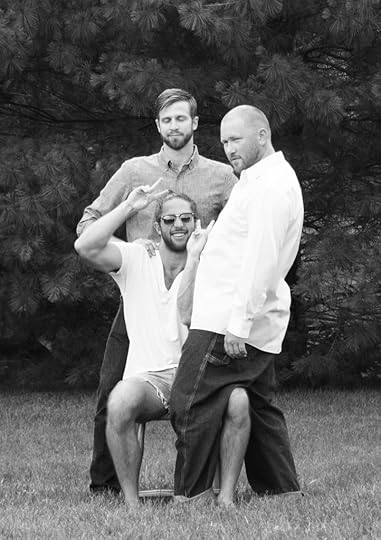
January 19, 2022
There’s truth in terror
 Photo by Luke Renoe
Photo by Luke RenoeLast night I watched a horror film with my friend. The Ritual. Beside the beautiful cinematography and gripping emotional ride, the film left me with something else—something more profound.
Fear.
As horror films do.
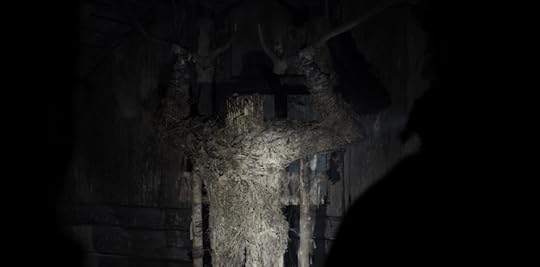
The film may follow the traditional horror route of concealing the full presentation of the monster, thus heightening the terror it causes, until the very end. But even after the reveal in The Ritual, something remains. It’s the type of film that makes you hustle to the bathroom in the middle of the night because of what could rush down the hall toward you if you walk too slow, or don’t turn lights on as you go.
Only later did I realize that something rich was residing beneath this terror—and all terror.
Immediately after the film ended, I pulled up an episode of 30 Rock to cleanse our palettes. I had to elevate my mind and my focus from the darkness that was The Ritual.
An hour later, I reflected on this. What was it about sitting in the dread, in the darkness, in the heavy weight, that was so uncomfortable? Is there perhaps something true to be discovered in terror and fear?
I wonder about my thalassophobia, the fear of deep, dark water,
about the infinite blackness of space,
and even wind blowing over the wide breadth of the prairie;
these voids present a horror all their own.
We fear the expanse.
We’re scared of the unknown.
We’re terrified of death as it’s the thinnest of walls dividing us from the biggest mystery of all.
This realization is nothing profound—people fear the unknown—except that beneath our constructed worlds of comfort and distraction lies nothing but mystery, and therefore, terror.
Perhaps it’s the black corners of the universe that highlight something about the nature of reality: That there is a dark corner awaiting us all; there is an infinite mystery beneath the thin platform we call life, and all of our platforms are crumbling.
There’s no such thing as standing on a shelf that won’t break down, dropping the occupants into the black mystery beneath. This is the nature of horror, when it’s done well. It reminds us that the universe we inhabit is 99.99% dark, unknown terror and everything else is just distraction.
There’s truth in terror that there is not in 30 Rock. Sitcoms and the like are feel-good distractions that we rebound right back to when we get a taste of the void.
Maybe we have something to learn from people who are afraid of everything—maybe they have a more accurate picture of reality.
Recently, someone, a Christian, told me “I could never believe in a god I have to fear.”
I wanted to ask her if she’s ever looked around at the universe we inhabit…and then ask herself who made it. Have you ever seen black holes or tsunamis? What about when the Bible says that God dwells in deep darkness? What about death? What about the horror of Good Friday?
The natural state of all living things is terror. If you don’t believe me, just walk toward a wild rabbit, deer, fish, squirrel, or lizard.
Humans are the only organism on earth who has invented a means of distraction from this, and boy do we abuse it. Anything that removes our mind from the looming darkness which will one day consume us whole quickly becomes our addiction. It’s also why, as Pascal pointed out, the hardest thing a human can do is sit alone in a room for ten minutes. The dread sets in.
We love light, both natural and artificial, as an escape.
The artificial light shoos away the impending darkness—literal and metaphorical. When we eradicate the shadows from our rooms, we have control; we have distraction.
When we illuminate our rooms and hallways, we have control of our portion of the universe. Now it’s only the other 99.99% we have to fear.
It’s also worth pointing out that light doesn’t actually make us any safer; it only makes us feel safer. You may be scared that an intruder is crouching in the corner of your bedroom. If he really were there, turning the light on wouldn’t put you in any less danger.
Now, the good Christian way to finish out this post is to remind us that Christ is the light in the darkness; the hope in the void. But perhaps that cuts short this meditation on darkness and terror. Perhaps a little horror can serve the thoughtful Christian well, and sitting in it for a while will cast us into the intellectual void which brings us closer to the source of all light, the foundation which does not crumble.
My newest tattoo is the words “The center will hold,” and it comes in handy here. It’s partly from military origin—will the center of your frontline, where the fighting is most intense—hold up to the onslaught? Will the thing you trust to carry you through sustain you?
In an existential sense, can the central focus of your life hold under the pressure of oblivion?
Or will your thin platform—whatever cheap substitute you’re using to distract yourself from the abyss—crumble beneath your feet?
Think on this.
Dwell in the darkness for a bit.
Let your mind roam out where there are both monsters and mystery, and don’t immediately retreat to the superficial distractions. These light and airy centers surely will not hold. They cannot sustain the burden of existence or the weight of fear.
What do you see out there among the trees and the darkness?
How do you feel as you explore the vastness of the void?
e
January 17, 2022
holy slowness
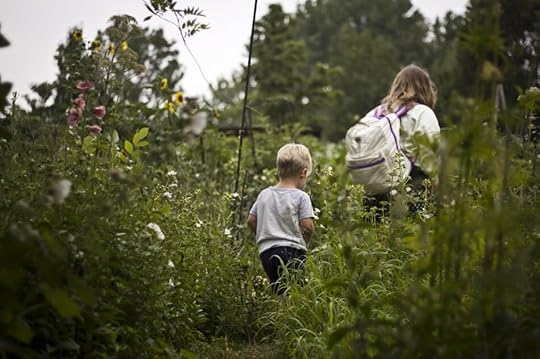
The older you get, the faster time feels for you.
I read that in a study somewhere and don’t feel like looking it up, but it makes sense. When you’re young, you only have so many hours under your belt. Each one feels massive. But after you’ve passed through a couple million, another hour is nothing.
It’s like money. A child gets a $5 allowance and it feels massive. But to the richest men in the world, or even your average middle class adult, it’s not that much. Because you have so many dollars already.
The same is true, so the theory goes, with your time. You get a lot of time and each one feels a little less big; a little less weighty.
I remember being young and my mom told me that a friend was coming over in four hours. In other words, I had to wait an eternity.
Now, I doubt I could get everything done that I need to and be ready for her in four hours.
Four hours is the same, but different.
Time changes.
Four hours is still 240 minutes, but feels like less than it used to.
I once asked a friend, How fast does time move?
She, a science teacher, began to speak and then paused. We are used to breaking up time into minutes and hours and seconds, but how fast do these measurements slip by us? What is their speed? Does it depend on the observer?
I had a cruel and unusual teacher in Middle School who would make students in his detention stare at the clock as punishment. Imagine how slowly those seconds ticked by.
Compare that to the seconds that rush by when you play basketball with gym buddies, or scuba dive. That time evaporates like steam from a camp stove.
I wonder how this relative experience of time translates to our memories. I look back on golden afternoons which seemed to stretch into perfect, magical nights which lasted much longer than tonight. When I reflect on adolescent evenings playing Night Games with the neighborhood kids, they seemed to last forever, yet somehow I was in bed by 10 at the latest.
Maybe the hours were longer back then.
Maybe time was slower.
Maybe children know something I don’t about eternity.
I bet that’s why nostalgia makes our past look so rich: if time moves slower when you’re younger, you can pack much more thought, feeling, and meaning into each moment.
I first held the hand of a girl in the backseat of a friend’s car. That ride felt like a magical oblivion. Of course it ended, but I don’t remember the end; I only remember being lost in the moment.
Now, we rush from one thing to the next and before we know it, the sun is down and we’re brushing our teeth.
Another day has ended.
Another one tomorrow.
Same ol.
I bet God wants us to be people of big, slow time. I bet that if we slowed down enough to keep up with Him, we may be able to hold onto those moments and feelings a bit longer.
Perhaps this is a small part of what Jesus meant when He told us to be childlike — that we should drown in the depth of the present; that our moments should stretch out indefinitely in all directions, rather than our normal mode of distraction and removal.
I look at my phone the second I get a whiff of boredom. I open my laptop when I get home. Remove me from this place and time until I am doing something entertaining again.
Maybe part of becoming childlike as we parade through time means slowing down and experiencing a holy slowness.
May we move through time much differently.
May we move through time like children again.
e
(Side note: see how science influences the rest of thought and culture? Einstein’s theory of relativity quickly trickled down into the realm of ethics. Everything is connected.)
–
For more thoughts like this, check out my latest book!



